Getting ready to travel to Bali is super exciting and we definitely don’t want any tiny detail to ruin the whole experience.
From making sure your itinerary is up to date to simply double-checking the visa requirements and navigating the airport, we got you covered.
This is the ultimate guide for anyone visiting Bali for the first time. We will share all the details and things we wish we’d known someone told us when we were those lucky first-timers!
Bali: What It’s Like?

Tucked away somewhere in the middle of the Indonesian archipelago, amidst the Indian Ocean you will land in Bali – the Island of Gods.
A world unique island with its own culture and Balinese Hinduism religion that transformed the daily habits and lives of locals.
It is the island of thousands of Balinese temples, stunning beaches, volcanoes, and rice paddies, and areas known for the best nightlife, infrastructure for digital nomads, or spirituality. One island – endless experiences accompanied by magical aromas of incense, frangipani flowers and gamelan music.
Also, let’s get one fact straight. Despite all the misinformation and buzz going on in the media for a while – it is completely ok for couples to stay in one room even if you’re unmarried.
The Best Time To Visit Bali

There are basically two seasons in Bali: dry season and rainy season. During the dry season, from April to November there is practically no rain at all, lower temperatures, and fewer tourists in some areas. If you want to go on a boat from Bali to other islands, the dry season offers the safest weather conditions.
During the rainy season, you can experience the real hot and humid tropical climate with thunders, and pouring rain that quickly changes for a clear sky. Island hopping is getting more tricky and the waters will be really choppy. It can affect diving conditions too if you’re looking to get your scuba diving certificate.
Another consideration is that the end of the rainy season, especially March to May is often the peak of Dengue fever cases.
But it rarely rains for days in a row, so you will be able to enjoy the island no matter what season you come.
Most tourists come either during school summer holidays or for Christmas holidays, but the island is busy with domestic and international visitors all year round.
If you’re worried about expenses, flights and accommodation will be the most expensive in December.
Some Balinese Holidays May Affect Your Travel Plans

The most important Balinese holiday – The Day of Silence or Niyepi, happens every spring on the date according to the Balinese calendar. That day and night no one is allowed to work, even the airport, use electricity and be outside.
In general, big ceremonies always involve some sort of procession down the street and sometimes it may cause a little traffic jam, but it is a one-of-kind sight you won’t see anywhere else.
How Many Days In Bali Are Enough?

The optimal duration of your stay in Bali is between 1 to 3 weeks. It will allow you to explore Bali and its different areas and even make day trips to neighbouring islands like the Gili Islands, Lombok, and Nusa Islands (Nusa Lembongan and Nusa Penida).
A two-week vacay will hit the sweet spot and you go home recharged and full of new experiences, beautiful pictures, and fun memories.
Bali is so diverse that you can spend here 1 week or 3 years and never get bored!
Travel Tips For First-Time Visitors To Know Before You Travel
To make sure your visit to Bali will be successful, start it right. Here are our top recommendations on how to prepare paperwork and pack for your travel.
Choose The Appropriate Bali Visa
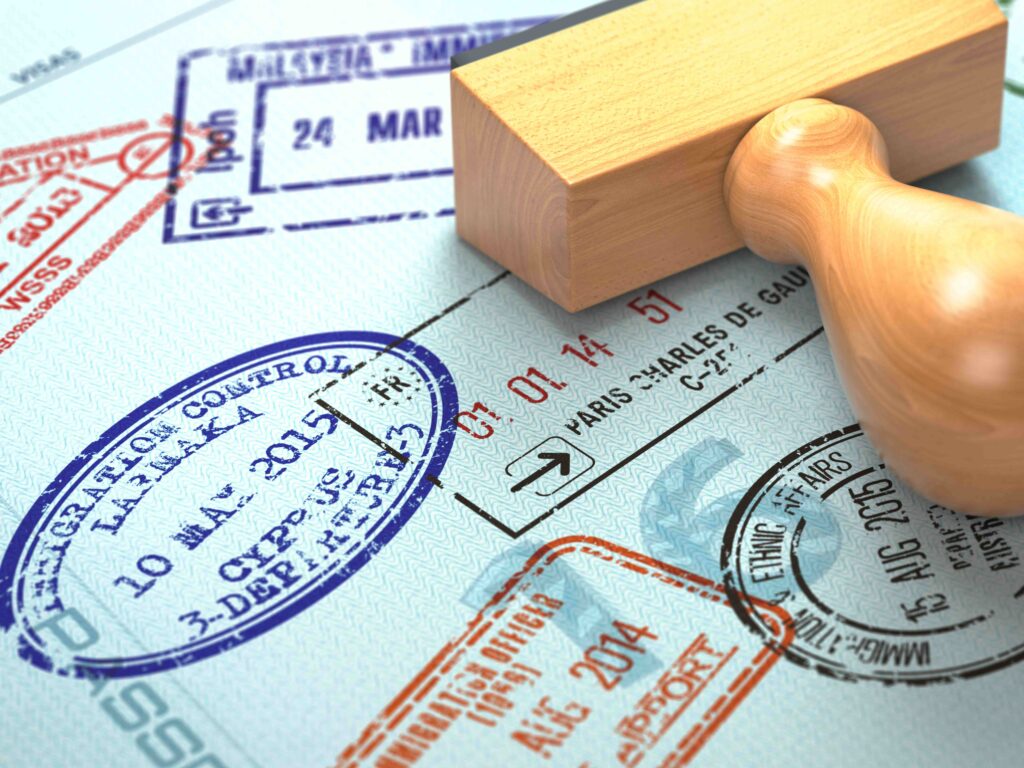
There are multiple visa options available, but you are probably looking at one of these 3 visas:
B1 Visa on arrival (VOA) is the easiest type of tourist visa that allows you to stay up to 30 days and can be extended 1 time for another 30 days. It is a single-entry visa.
B211 /C1 Tourist Visa (formerly known as Social Visa) is another single-entry visa for tourists that is given for 60 days and can be extended 2 times.
E33G Digital nomad visa (Remote worker KITAS) allows digital nomads working for a company abroad to stay in Bali (and Indonesia) for 1 year. It doesn’t unfortunately cover self-employed freelancers nor does it allow you to work for an Indonesian company.
Not that B1 and C1 visas are technically not suitable for remote workers or any work at all.
You can gather all the needed documents and submit them online through the official immigration portal or contact one of the many visa agents operating in Bali.
Online: Official e-visa site
Apply For Visa On Arrival Online
Many countries, including Australia, are eligible for vision arrival. Meaning, you can simply buy a ticket to Bali, land and get your visa when in Bali. It costs around 50 AUD.
However, Bali airport gets really busy and many people will line up for the same VOA so it can take a while for you to get yours. To avoid queueing you can simply do the process online beforehand.
The online system can take time too, but at least you will have all your paperwork by the time you need to go to Bali.
Please, note, that there is no official fast-track service at Bali airport.
Submit Customs Form Before Boarding

Once you arrive in Bali you will see lots of people crowding before the customs area – all of them are filling out their customs declaration.
To save yourself time, and pass through all the checks smoothly, simply fill out the form before boarding the plane (or while on the plane if you have a WI-FI connection). Once the form is submitted you will see a QR code. Screenshot it in case, you won’t be able to reconnect to the website later.
If you can’t find the QR code for the website, use this link: Customs Declaration (form in English).
Have Return Ticket On Hand
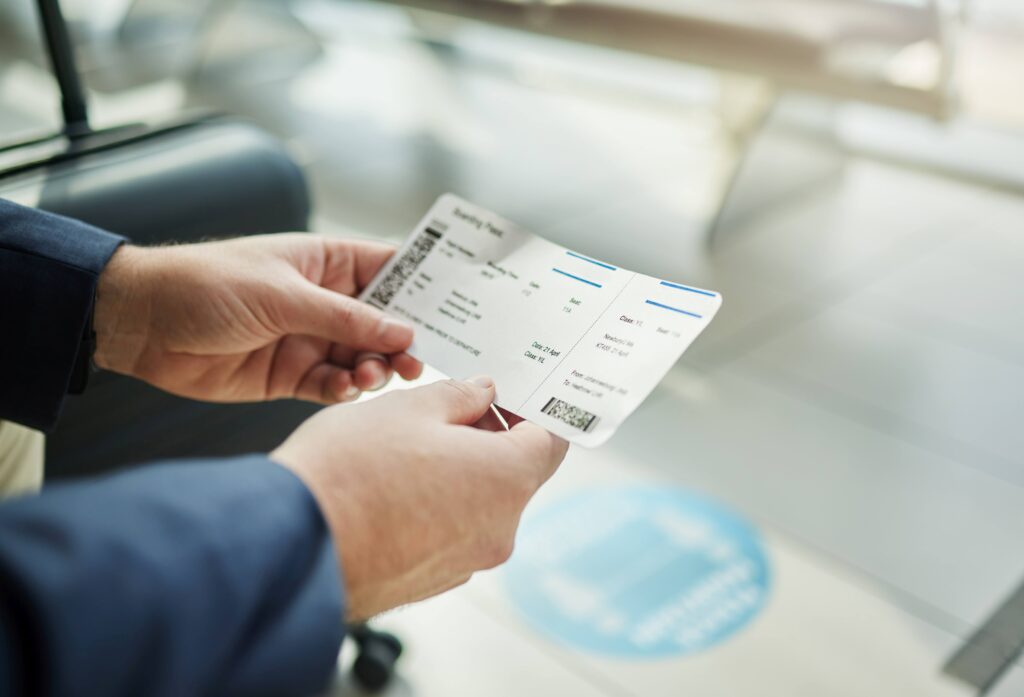
Airlines are allowed to not let you on board if you don’t have a return ticket from Bali, especially if you’re visiting the country on a tourist visa.
You may be lucky and nobody will check it, but it is better to have it than risk not flying to Bali at all.
SATUSEHAT Health Pass (SSHP)
Since August 2024, every visitor has been required to fill out the health form.
It can be a temporary requirement and it can be lifted by the Indonesian Ministry of Health later this or next year, but it is best to fill out the form beforehand on the official site of SSHP just to be safe.
Online: SSHP
Travel Insurance

Getting proper travel insurance is mandatory if you want to visit Bali. Make sure dengue fever, riding motorbikes and extreme sports like surfing are included.
Note, however, that for your insurance to actually cover bike accidents in case you’re the driver, you have to have an international license.
Double-check if your insurance has deductibles. For example, Safety Wing is a popular choice but you will be required to pay first and only then you can claim the expenses. The health care in private clinics, and especially emergency procedures and surgeries are very expensive in Bali.
Do Not Overstay By Mistake
Make sure the planned return date is exactly within your allowed number of days. Every single day of overstaying in Bali leads to a big fine (1,000,000 IDR or almost 100 AUD per day!). Plus you may risk being added to a blacklist if you overstay many days.
Often people will book a return ticket and it will be just 1 or 2 days outside the visa on arrival number of days. In this case, you will have to pay for an extension and do so at least 7 days before the visa expires.
You can contact an agent to take care of it, or simply head to the immigration office in Jimbaran to deal with it yourself.
Register Your Phone If Staying Long-Term

If you’re coming with a long-stay visa like a Digital nomad visa or similar, you will need to register the IMEI of your phone at the airport upon arrival.
This applies to any other visas if your plan is to stay longer than 90 days.
The procedure will require you to fill out a form and pay an import tax based on the value of your phone. The customs officer has a way of checking the value and they can ask questions like when and where was the phone bought, what are the specs, etc. So be ready to answer these questions (you don’t have to show a receipt, but it will help).
The phone registration room is right after the customs check when officers scan your declaration code and your bags.
If you don’t register your phone in the system, after 3 months you won’t be able to have reception or Internet connection.
Online: IMEI registration (you will still need to visit the customs office at the airport).


Things To Pack That You’re Going To Miss
Bali is a tropical island so bring comfy shoes, flip-flops, and lightweight summer clothes. Most of the things are available to buy in Bali, but not all of them are cheap.

Sunscreen with SPF 50 minimum. Bali sun is scorching and without good protection you will burn quickly. Pharmacies and shops have a few sunscreen options but they can be quite pricey.
Bug spray. While Bali has bug repellent, it doesn’t suit everyone, especially people with sensitive skin and it has a really strong artificial smell.
Get lots of T-shirts and shorts that are breathable, easy to wash and quick to dry. Do not bring expensive clothes – you may need to use laundry services and sometimes they lose the items. You don’t need tight clothes. Linen will be better than cotton.
For Women: pack hygiene items, tampons are hard to find and are too expensive in Balim and pads tend to be extra large which is not always comfortable. Also bring hair care products, as Bali water can be harsh and between chlorinated pool water, sealed ocean, sun, and hard tap water, the hair can lose its beauty and strength.
You don’t have to bring a rain jacket – you can easily buy a simple poncho on every street in Bali and it will get you through your stay. Don’t bring a sarong either, Bali has loads of handmade and cheap sarongs that are absolutely beautiful and you can use them as a beach cover or bring them home as gifts.
How To Get Around Bali: Safe & Affordable Ways Of Transportation
From The Airport
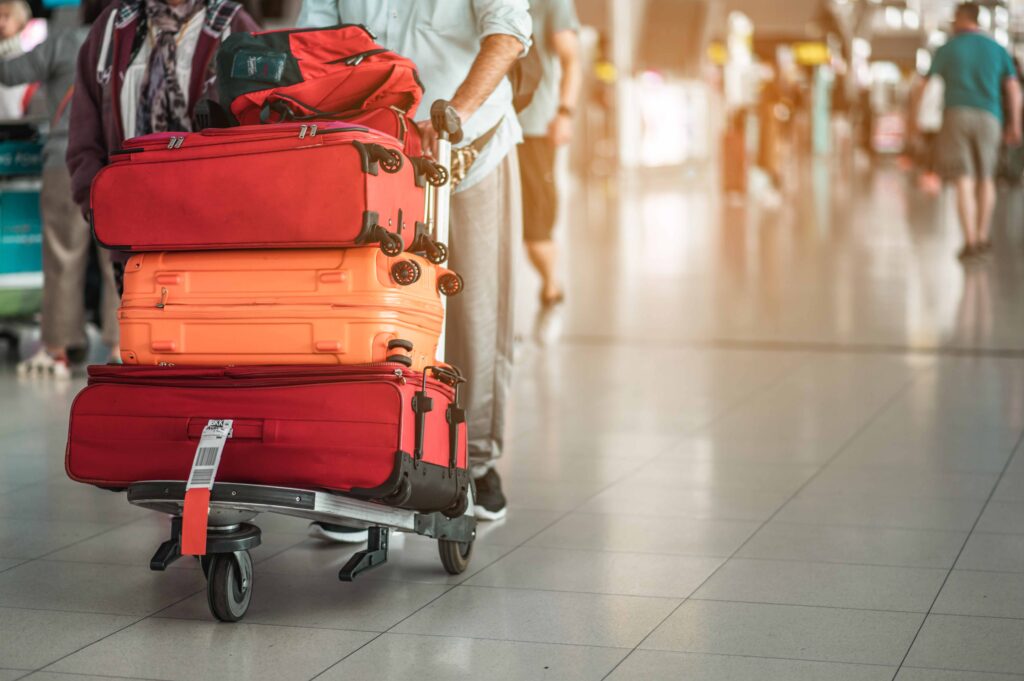
Getting from Ngurah Rai International Airport to your accommodation will be very easy: there are airport transfer options if you’re staying in a hotel, taxi, private drivers, or even renting your own car or bike. We should point out that going with one of the taxi drivers trying to get your attention right at the exit of the airport may not be the cheapest option.
The safest option is to exit the airport and head to Grab or GoJek instant booking waiting zones right in front of the exit. The staff will help you get the car in a matter of minutes and you will be on your way. Blue Bird taxi is also available but not as popular or affordable.
Both zones have Wi-FI so even if you don’t have a SIM card yet you will be able to get a car. You only need to have the Grab or GoJek app installed.
Getting Around The Island

For a day trip between the areas and with long waiting hours and a few stops on the way, the best option to get around is to hire a private driver. The rates are rather reasonable and there are many female drivers for solo female travellers too.
The second best way to get around Bali is to use taxi apps. Download Grab and GoJek beforehand – those are super apps for taxis, food delivery, and shopping. You can pay by card or cash, but note that sometimes international cards don’t connect to the account. This option is always the most affordable.
There isn’t yet a public transportation network covering the whole island, but there are a few bus lines connecting Ubud and Denpasar – Taman Bus. The schedule and routes are available through the MitraDarat app.
Zones With No Online Taxi Access

Taxi apps work amazingly in the busiest tourist areas in south Bali like Canggu, Seminyak, and even Kuta. Ubud also has GoJek but it can be more challenging to get a ride sometimes. If you go off the beaten path, scooter taxis will be unavailable.
Plus, there are some zones, where you’re not allowed to use online taxi apps at all: Echo Beach, Pandagbai Port, some areas in Uluwatu, and more. The local villages in these areas don’t welcome taxi drivers from the apps and encourage you to use one of the local drivers (this is also called the “Taxi Mafia”).
The taxi driver will be able to drop you off somewhere around, but you won’t be able to make an order from these two locations.
Driving On Your Own
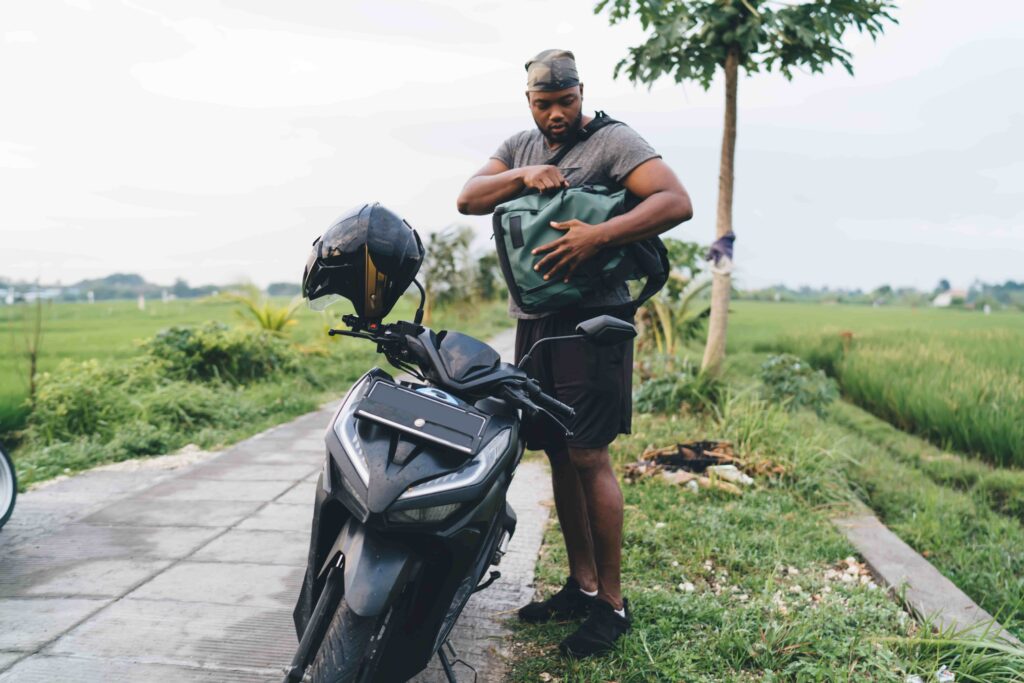
If you bring your International Driver’s License obtained in your home country (not through an online service) and it covers motorbikes, you are allowed to drive on your own. It is probably the best way of transportation in terms of being independent, but be ready to spend some time in traffic jams.
If you’re not confident in your skills, you may take a few lessons once you’re in Bali.
Google Maps is not always reliable and the estimated arrival time is almost never accurate, so account for that when driving around the island.
The Best Place To Stay First In Bali With Affordable Accommodations

Canggu. Busy, vibrant, young and loud – Canggu is the top destination for digital nomads, partygoers, and those who love good dining and shopping. It has all you need for a comfortable everyday life and has a central location – ideal for day trips.
Ubud – cultural hub of Bali with rich royal history, numerous art galleries and museums, lush dense jungles, and the best vegan cuisine on the island. Healers of this magical island take clients in Ubud and it is here where you can join yoga teacher training programs, meditation retreats, or simply get lost in nature.
Uluwatu is famous for its beautiful beaches and amazing surfing for intermediate surfers. It is mostly a clifftop area with great views, many surf shops, vibrant community, and it is becoming more and more developed by the day.
Sanur was formerly known as a retirement destination, but the comfort of daily life here and the amazing beaches suitable for swimming brought many families and introverted ex-pats here. Those tired of partying and preferring white sand beaches, yet affordable accommodations, choose Sanur. It is also very close to the port which makes island hopping a breeze.
Nusa Dua focuses mostly on delivering 5-star services for tourists. If your Bali travel spans only 10 days, you will be pleasantly surprised by resorts in Nusa Dua. They all come with top-level international restaurants and spa facilities, and most of them have beach access. A wonderful place to recharge at your own pace, and as a bonus, it is not far from Ngurah Rai Airport.
Amed. If this beautiful island is calling you because you are passionate about marine life, Amed would be ideal for snorkelling and getting your diving license. You can still observe simple Bali life in the village and yet it has a lot of amenities like a gym, coffee shops and even a sustainable shop. Even if you’re staying in Canngu, Amed would be a perfect trip for a couple of days.
Must-Do Things For First-Time Visitors
The Bali itinerary bucket list of a first-timer should definitely include these locations and activities:
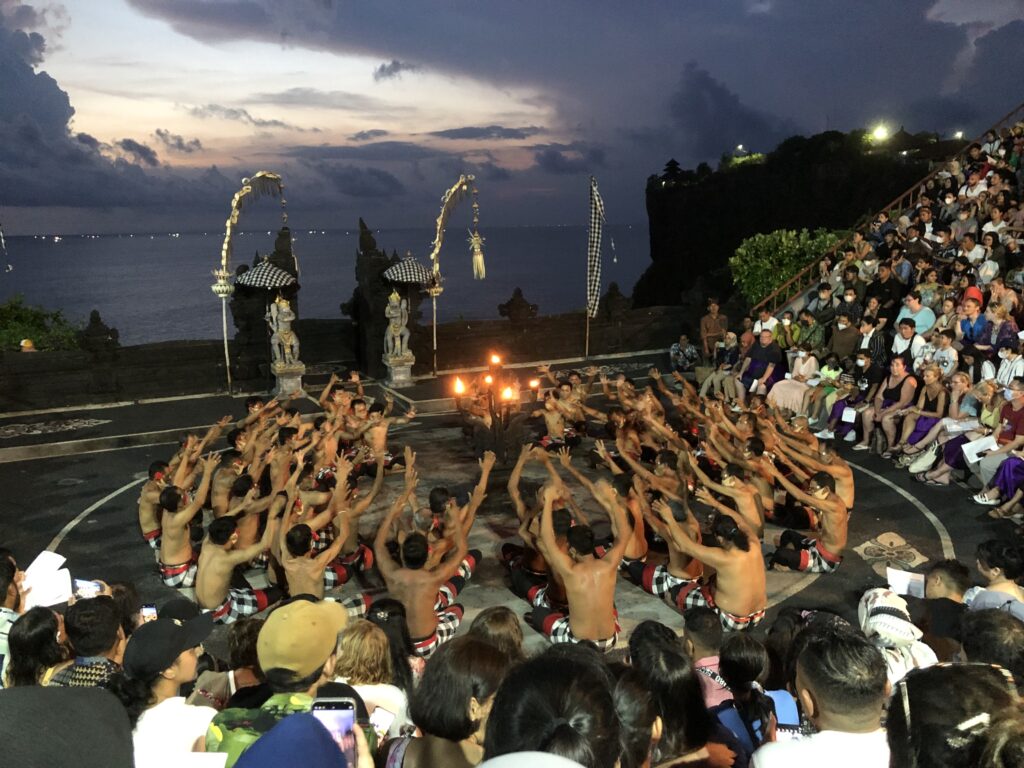
Explore temples and spirituality: Visit Uluwatu temple and watch the Kecak dance performance, check out the Tanah lot temple complex – a unique water temple perched on a rock right in the ocean, and of course, participate in melukat – Balinese water purification ritual.
Love nature. Walk through rice paddies: there is the Jatiluwih UNESCO Heritage site, Teggalalang rice terraces, and many trails through rice paddies in every area. Explore popular and hidden waterfalls. Aan Waterfall should be on your list. It is a nice trek to the waterfall through the surrounding jungle.
Meet wildlife and marine life. Bali’s location within the Coral Triangle makes it one of the best places in the world for snorkelling and diving. You can see Mola-Mola fish, huge manta rays, and dolphins in the ocean. And West Bali has the only National park on the island – with deer, unique monkeys, and stunning exotic birds. Don’t want to venture far? Visit Ubud Monkey Forest Sanctuary to meet monkey families in the wild.
Do some island hopping: do a Nusa Penida day trip to see the famous T-Rex beach and cliff, and Gili islands to relax on white-sand beaches and swim with turtles.
FINNS Beach Club tops the list of the world’s best beach clubs and is the dream destination for parties and chilling on a sun lounger in Bali watching the sunset.
Best Indonesian & Balinese Food To Try

Local food is an inseparable part of the Balinese culture. 5 dishes should be on your list, as they are proclaimed the national dishes of the country:
Nasi goreng (fried rice, a type of mixed rice with different ingredients). It can be vegetarian, with chicken or seafood.
Gado gado (veggie salad with peanut sauce)
Satay – delicious grilled skewers with chicken, beef or goat meat. Usually served with peanut sauce, rice, and some fresh veggies. Try them with sambal mata – a spicy condiment with shallots and chilli.
Soto ayam – iconic chicken soup, often made with some vermicelli and cabbage. Lifts you up and works great if you feel a bit sick.
Beef Rendang is probably the dish Indonesia is most proud of. It is a slow-cooked beef dish with a dry-ish paste and tons of flavours and spice.
You should also not miss the opportunity to try the Balinese delicacy – babi guling (spit-roasted pig) and Indonesins’ favourite bakso – a cheap eats heartwarming soup with meatballs.
A highlight of the food scene in Bali is a visit to a local fish and seafood market in Jimbaran – you can not only buy freshly caught crabs, fish, prawns, octopuses, and even lobsters but have them cooked in flavorful garlic or spicy sauces right there.
If at any moment you miss Western food, Bali has some of the best international restaurants in Indonesia from cozy coffee shops and vegan cafes to Michelin-level fine dining restaurants. Everywhere on the island, you will be able to find Instagram-worthy smoothie bowls, avocado toasts, and great coffee.
How To Avoid Bali Belly

Nobody wants to spend days in the bathroom instead of heading to your next Bali adventure. The one thing that can be in your way is Bali Belly. A severe case of food poisoning that pairs with diarrhea and, as a result, dehydration.
To avoid it make sure not to eat raw or undercooked meat from street food stalls, and do not eat at places where there are no customers. Old cooking oil and lack of general hygiene in the kitchen in such a hot tropical climate make a very good environment for bacteria and viruses.
And of course, no matter what, do not drink tap water. Buy bottled water to stay hydrated.
If you’re sick already, get Norit charcoal pills at any local pharmacy, and lean heavily on coconut water, probiotics, and if you feel very sick there are a few mobile IV drip services around Bali.
Tourist Traps & Scams

Being vigilant is necessary no matter what country you go and you should always exercise caution and common sense if something feels off.
Never change money in unauthorized money changer booths on sidewalks. They tend to “miscalculate” your money and keep some.
Avoid lesser-known ATMs. They may have higher fees, swallow cards, or have skimming equipment installed.
It is best to buy a SIM card through a bigger shop. Sometimes vendors may sell you a sim card and take money for the top-up but you will soon realize that the money never reached your balance.
Avoid drivers you don’t know. They may want to take you “on a tour”, or quickly stop by a friend’s shop that will happen to be a jewellery shop and you will be somehow forced to buy things. Not only this is a popular scheme in many South-East Asian countries, but such jewellery can be fake.
Rules About Visiting Temples & Sacred Sites
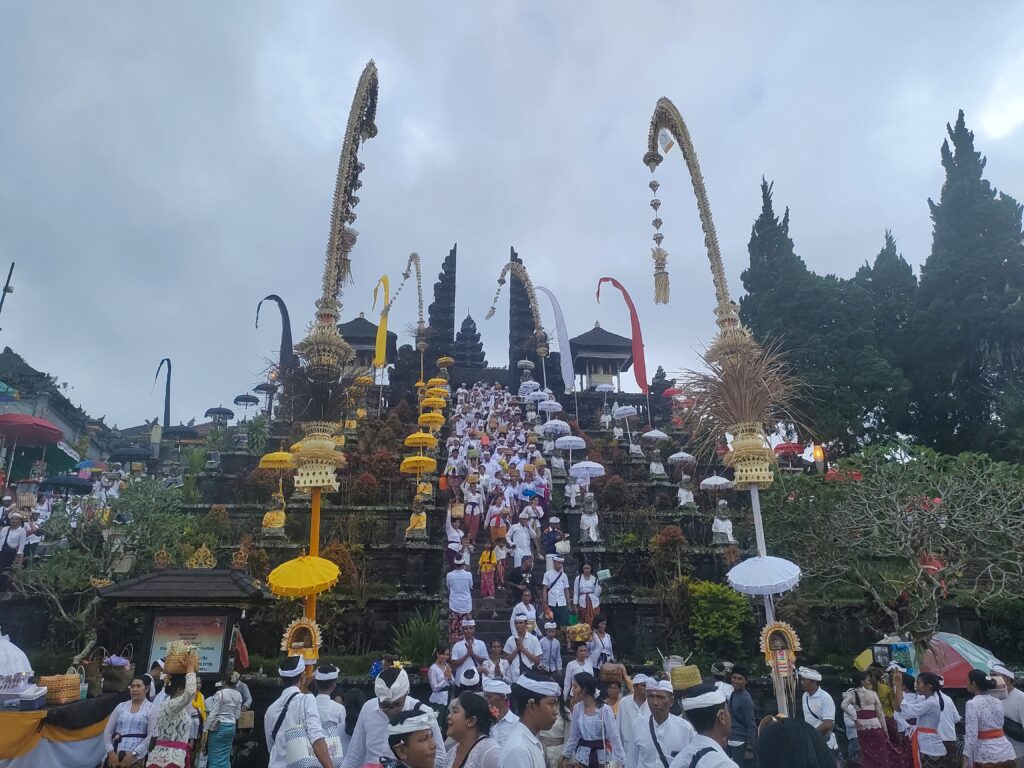
Local culture is a pillar of the Balinese lifestyle. Not only every temple complex is sacred, but also majestic Banyan trees (those massive trees with “walking” roots), and even some beaches.
The two most important rules tourists should know about visiting temples are:
Dress appropriately and modestly: cover your shoulders and knees. Most temples will be happy to rent a sarong for you once you make a donation.
Women can’t visit sacred places during menstruation.
You will see that Balinese people make daily offerings for the spirits on the road. Be respectful and don’t touch or walk over it.
Budgeting Your Trip: Money Tips

Probably, the most challenging and tedious part of trip preparation is making a budget. We can’t stress enough how important it is to have your daily budget in mind as Bali will throw at you so many fancy cafes and adventurous day trips that it can be easy to overspend.
Approximate expenses you may have in Canggu:
Accommodation: Hostel room: 100,000 IDR (from 10 AUD) but most budget accommodations with decent rooms will be around 350,000 IDR (34 AUD). Hotel rooms with a view, in a 4 or 5-star hotel in Canggu can be up to 500 AUD per night. As you can see, the range is wide.
Taxi: A bike taxi to get around Canggu will be 20,000 IDR 30,000 IDR (2-3 AUD), and the car ride will be around 6 AUD for a short ride.
Cappuccino: 35,000Rp (3.5 AUD)
Smoothie bowl or simple breakfast: 60,000-100,000 IDR (6-10 AUD)
Local eats, for ex., skewers with rice at street food stalls – under 2 AUD. Note that there are plenty of elevated Indonesian food restaurants that will charge for the same type of food with a fancier presentation of up to 10 AUD.
Dinner for two: 400,000-600,000 (40-60 AUD)
Cocktail or beer at a simple beach bar: 35,000-50,000 IDR (3-6 AUD). In a restaurant, a bottle of beer can be around 6 AUD and a glass of wine around 12 AUD.
Petrol: on average 12,500Rp (1.21 AUD) per litre or a better quality gas.
Car rental: around 350,000Rp (35 AUD) for 24 hours. Parking fees are small, less than 0.5 AUD.
Every shop and restaurant will only use Indonesian currency and while many places accept cards, you should always have more cash on hand than relying on cards as local markets only accept cash and some places will charge an additional 3-5% card fee.
Be mindful that most prices listed in cafes do not include taxes and service fees. These can reach an additional 21%.
Negotiate The Price At The Market
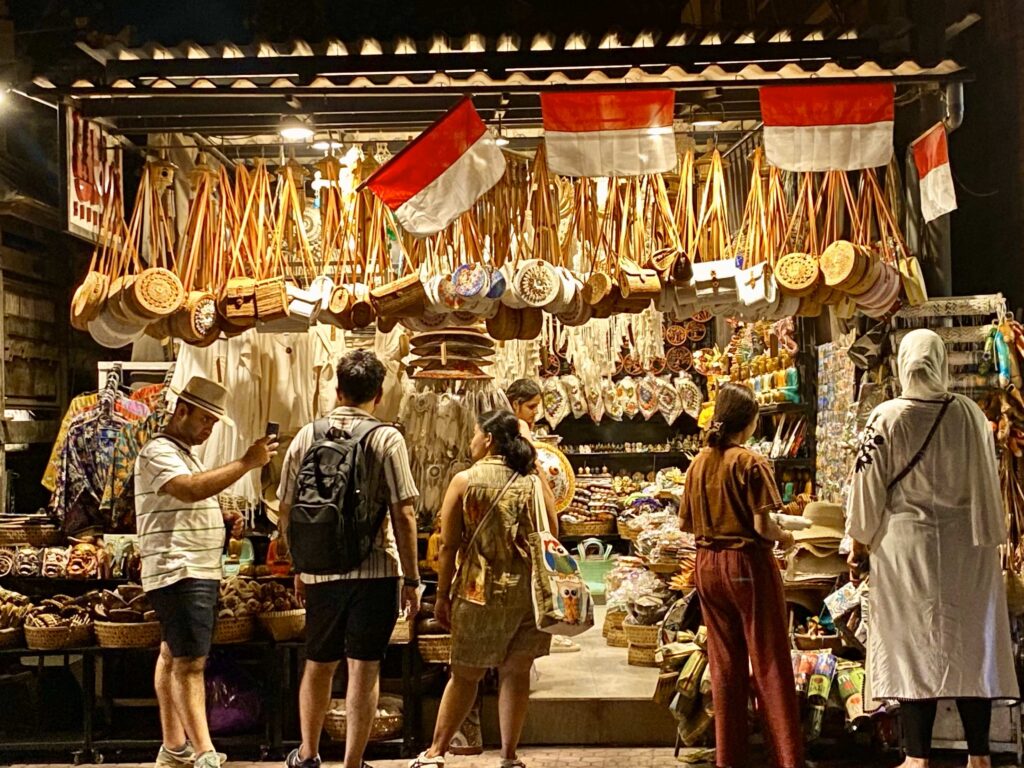
Haggling is acceptable in Bali, especially at the market. Of course, there is no reason to try bargaining at any of the many malls in Bali.
Street vendors at the markets may seem pushy sometimes and if you’re up to it, you can easily save up to 50% of the price. Speaking a little bit of the Indonesian language can help too.
A big don’t is to haggle down to a good price and turn around, locals may consider it rude. So if you’re starting the negotiation make sure you really want the item in question.
Tipping Culture

While tips are not mandatory or expected, they will make a huge difference for locals.
The average salary in Bali is less than 290 AUD per month and most households have a whole family, with many siblings, living under one roof.
If you feel like you received a good service, you can tip around 5-10%. It is an especially nice gesture for drivers, massage therapists, and waiters who only receive a portion of the money you’re paying for the service.
There is, unfortunately, a category of people, some tour guides and drivers who will ask, and not always in a polite way, and expect a tip from you even if the service wasn’t yet executed or wasn’t exceptional. It is up to you what to do in such a situation, but we would suggest not to encourage such people.
Useful Apps To Install
Before travelling to Bali you can install these apps:
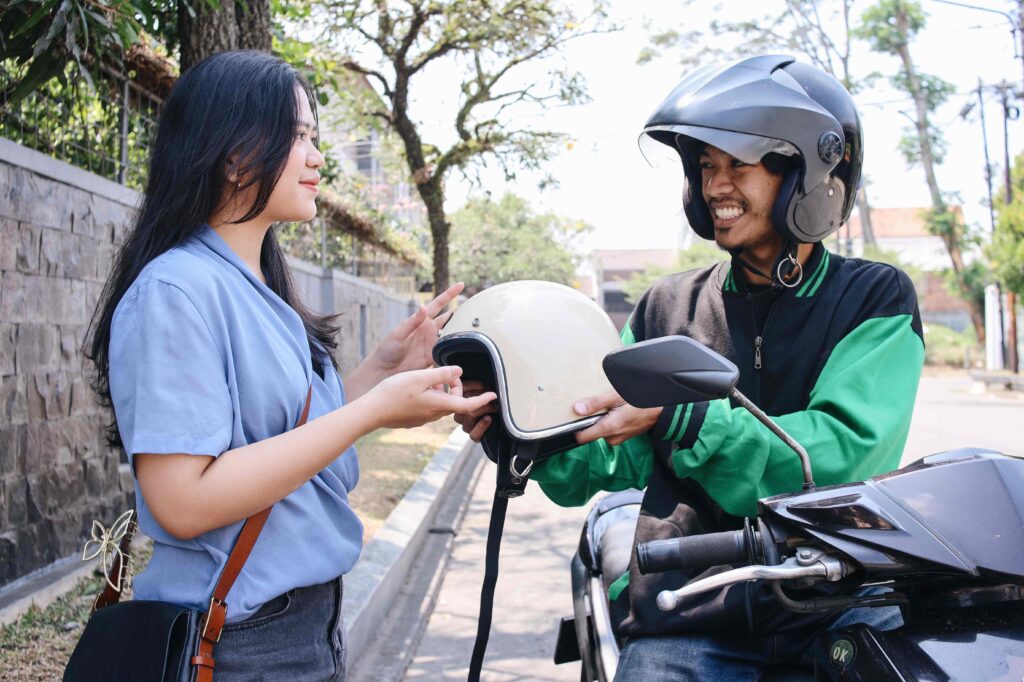
Grab and GoJek – food delivery from the majority of the restaurants in Bali, including local food. It also has a taxi and a shopping tab.
Google Maps for directions, checking reviews, and finding the best spots to eat. Opening hours are not always accurate.
Google Translate. Not all locals speak English and it will help you communicate.
ClassPass is an app that can give you credits to use in gyms and beauty salons in some countries.
The Secret Society is an app for those with some social following. Once you’re accepted you can get invitations to try fitness classes, new cafes and activities for free in exchange for some content.
Safety Tips

Apart from being mindful of common scams in Bali, there are also a few more things to keep in mind to stay safe.
Earthquakes. There is rarely a warning about an earthquake beforehand, but at the same time, strong quakes are very rare. If you feel an earthquake and want to make sure there is no tsunami coming (not a single one in the past 30 years), you can follow the official account of the Meteorology Centre of Indonesia BMKG on Twitter.
Petty crimes still exist. Don’t flex your expensive jewelry and don’t hold your iPhone in your hand while driving on the bike. It can be snatched.
Always wear a helmet. Even if you’re a confident driver, there are enough people who are not.
Methanol poisoning. Unfortunately, it is still a thing, but only if you go to a no-name bar or accept drinks from strangers. It can get pretty nasty and you will hear stories about people going blind. Go to FINNS Beach Club if you want to have a safe drink and watch the sunset.
Be Aware Of Rabies

Rabies is a virus that can cause encephalitis and ultimately lead to death. Historically Bali is considered to be a “rabies zone” which means you need to be particularly careful with stray dogs and wild monkeys.
Unfortunately, to this day, every year there will be a few cases.
While those are rare and you don’t have to have rabies vaccine, we would highly recommend having it, as it is not worth the gamble.
Be careful interacting with animals, Bali has lots of street dogs and cats, and some northern areas, as well as Ubud, have wild monkeys, which are not always friendly, especially if there is a baby monkey around.
If you were bitten, head straight to the hospital, make sure your insurance covers rabies and get a series of shots right away. To be fair, you may have to visit a few hospitals, as some clinics charge extraordinarily high prices for each dose.
Do Not Drink Tap Water

Under no circumstances you should be drinking tap water in Bali, or anywhere in Indonesia, even if the hotel or villa you’re staying at has a water filtration system.
Bali doesn’t have a megapolis-level sewage and water management system, plus many villas have water coming from individual wells, and these water sources may have never been tested.
Most of the time, water in Bali is quite heavy in minerals and can be harsh on our skin, hair, and ultimately, stomach.
If you have a particularly sensitive digestive system or skin (or scalp), use bottled water for cooking and washing your face, and make sure your accommodation has a proper water filter (do not expect this, such systems are expensive and rarely installed by default).
Useful Emergency Numbers To Save For Your Bali Trip
First, dial the country code +62 and then the number.
-
Police: 110
-
Fire Department: 113
-
Ambulance/Medical Emergencies: 118 or 119
-
Search and Rescue: 115
General Emergencies – 112
The officers may not speak English well so we do recommend having a local friend or someone who speaks a bit of Indonesian to help you.
Useful Indonesian Phrases

Some commonly used phrases and words that will make locals smile and be excited that you’re trying to speak their language:
-
Hello / Good morning / Good evening – Halo [halo] / Selamat Pagi [slamAt pagI] / Selamat Malam [slamAt malAm]
-
How are you?/ Good – Apa kabar? [apa kabar]/ Baik [baik]
-
Thank you – Terima kasih [trimakasi]
-
No – Tidak [tida]
-
How much? – Berapa harga? [brApa hArga]
-
Yes – Ya [ya]
-
Polite for ma’am / sir – ibu [ibU] / pak or bapak [pa/bapa]
-
What is this? – Ini Apa? [in apA]
-
Excuse me! (when trying to get attention at a cafe) – Permisi! [permIsi]
-
Sorry! (apologizing) – Maaf [maAf]
-
Help! – Tolong! [tolOn]
-
Take care, be careful (common phrase to use as a goodbye) – Hati-hati [ati-ati]
Ordering food and navigating the menus in local restaurants:
-
Goreng [goren] means fried, bakar [bakar] = grilled
-
Nasi [nasi] is rice, and mie [mi] is noodles
-
Te / Kopi [te / kopi] – tea / coffee.
-
Es [es] – iced (or ice)
-
Panas [panAs] – hot
-
Pedas [pedAs] – spicy. Tidak pedas [tida pedas] – not spicy
-
Gula [gula] – sugar
-
Enak [enak] – Delicious
-
Minta… [mintA] – To order something, I’d like…
-
Bisa bayar? [bisa bayar] – can I pay?
Note that Bali also has a Balinese dialect that has completely different words. You don’t have to learn it though.
FAQs
What I Wish I Knew Before Visiting Bali?
We think the most common misconception about Bali is the budgeting. You need to do proper research on things you want to do and plan to eat out or cook at your accommodation.
Another thing is clothes. You will need just simple clothes and it will be too hot to walk and really dress up daily, especially if you’re planning on being adventurous.
Is $100 A Day Enough For Bali?
While Bali is not as cheap as you may think or as it was 5 years ago, 100$ will be more than enough for a very comfortable stay in Bali. This can include simple accommodation too.
What Are The Dos And Don’ts In Bali?
There is an official list of rules to follow in Bali with the baseline being – to be respectful of the Balinese culture which is a mix of Hinduism and Islam, and to follow common sense and general rules on the road.
The don’ts include, based on previous sad experiences of some foreigners: do not ride a bike without a helmet, do not ride a bike on the beach or into the ocean, do not enter the temples or sacred sides with uncovered knees and shoulders or without clothes, and respect Balinese way of life.
Final Thoughts
One of the major tourist destinations in the world, Bali, gets millions of first-time visitors per year.
If you’re one of them, get ready to be mind-blown by its beauty, diversity, year-round tropical summer, and amazing people and culture they are nurturing.
Read more:
What To Pack For Bali? Your Ultimate Bali Packing List
Solo Traveling Bali: Your Ultimate Guide To Enjoying The Island Unescorted
The Ultimate Guide To Backpacking In Bali 2025: How To Have The Best Bali Adventure














